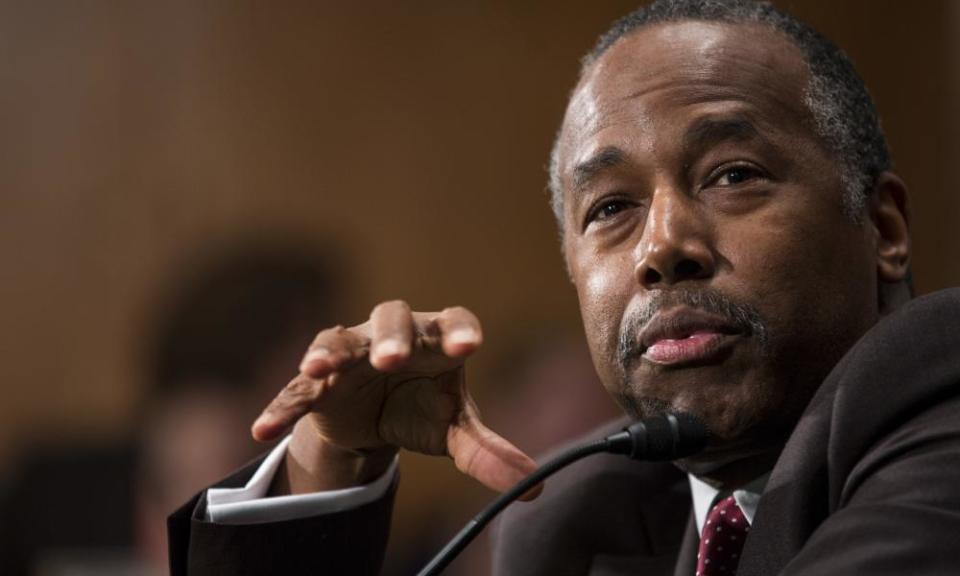Ben Carson hails homelessness agency that Trump budget would eliminate
Head of housing and urban development did defend proposed cuts that would affect agency, saying: ‘We have to stop the bleeding if we’re going to get healing’

Ben Carson, a neurosurgeon and the secretary of the Department of Housing and Urban Development, has defended massive cuts to his own agency , saying “we have to stop the bleeding if we’re going to get healing”.
Speaking before a Senate committee, he offered no objections to the budget proposed by the Trump administration, which envisions a funding reduction of $7.4bn compared to 2017, or almost 15%. In a surprising turn, Carson praised the work of a federal homelessness agency that the Trump budget eliminates.
Carson was asked how he would ensure collaboration between federal agencies, and in his answer he highlighted the work of the US Interagency Council on Homelessness, praising it as “effective”.
It was unclear if he knew, or at least he did not mention, that Trump budget’s does away with USICH. Susan Collins, the Republican senator from Maine, politely brought this up, adding that she regarded it as a “huge mistake”.
Carson, an acclaimed surgeon and failed Republican presidential candidate, has never run a large government bureaucracy before, and hearings today and tomorrow are being closely watched for signs of how he will lead the Department of Housing and Urban Development. The agency maintains and builds affordable housing, provides rental vouchers to low-income Americans, and funds homelessness services.
While the atmosphere at the hearing was largely congenial, Democratic senators voiced their strong disapproval of the suggested downsizing of the department. Collins described the cuts in her opening remarks as “stinging” and said she was “deeply troubled” by them.
“I recognize we have budget constraints but hope we can do better than this,” she said, and added later that the cuts would put people at risk of becoming homeless.
One analysis suggested that more than 250,000 people might lose housing assistance. Another calculated that 25,000 people could become homeless. Still, the Trump administration’s budget is just a proposal, and Congress will ultimately create its own.
Carson laid out his approach to managing the agency as one of doing more with less, and suggested that greater efficiencies would ensure that HUD could offer the same assistance as in the past. The agency has been criticized for providing housing assistance to tens of thousands of families whose income levels made them ineligible.
“It would be much nicer if we just had an infinite pot of money, but we don’t,” he said.
“This has been forced on us,” he said of the budget. “The old paradigm is the government rides in on a white horse with buckets of money and says, ‘build these facilities for these people’.” The new paradigm, he said, would involve the government providing seed money for new projects and attracting investments from not-for-profit groups and the private sector.
Senator Brian Schatz, a Democrat from Hawaii, argued in response to Carson that the budget “is not forced upon us, except that it is the priority of this administration to cut taxes in the amount of anywhere from $1tn to $5tn over the next 10 years”.
Carson replied that the situation was in fact “forced upon us by years of fiscal irresponsibility”.
Regarding homelessness, Carson affirmed the importance of the current best practice, which is called “housing first” and involves offering a homeless person a permanent residence as quickly as possible, saving them from being shuttled between shelters.

